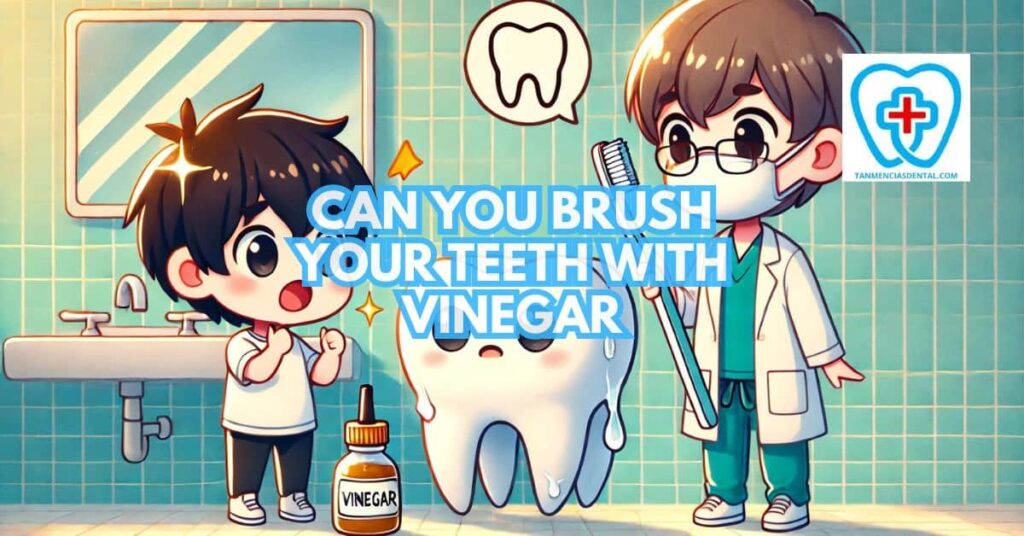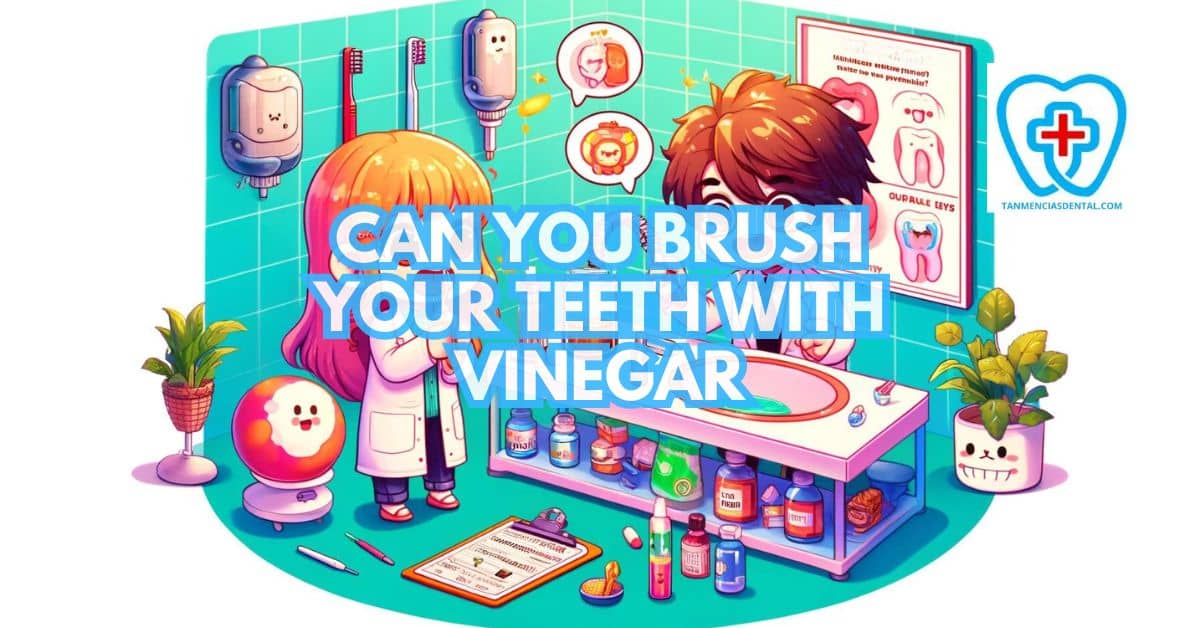Vinegar is a popular household item known for its many uses, from cooking to cleaning.
This has led some people to wonder, can you brush your teeth with vinegar as a natural alternative to toothpaste?
While vinegar has antibacterial properties, its high acidity raises concerns about potential harm to your teeth.
We’ll explore the benefits and risks of using vinegar for oral care.
We’ll also look at safer alternatives to help you maintain a healthy smile.
1. Skip the Vinegar! Why It’s Not a Good Idea to Brush with Vinegar
Brushing your teeth with vinegar might seem like an effective way to kill bacteria and clean your mouth, but the long-term effects are concerning.
The acid in vinegar can quickly begin to break down tooth enamel, the hard, protective coating on your teeth.
Once the enamel is damaged, it does not regenerate, leaving your teeth vulnerable to all kinds of dental problems.
Regular use of vinegar for brushing can lead to increased tooth decay and sensitivity, making it a poor choice for oral health.
Dental professionals strongly advise against using vinegar as a toothpaste replacement due to these harmful effects.
🦷 Why Community Dental Care Matters: The Impact of Local Clinics on Oral Health
2. How Vinegar Affects the Bacteria in Your Mouth
Vinegar can kill some of the harmful bacteria that cause tooth decay and gum disease.
However, it also harms the good bacteria that help keep your mouth healthy.
When the balance of bacteria is upset, it can lead to problems like infections and swollen gums.
This imbalance makes it easier for bad bacteria to grow and cause more dental issues.
Maintaining a healthy balance of bacteria is important for overall oral health.
🦷 The Hidden Benefits of Salt for Teeth: Natural Solutions for a Healthier Smile
3. Understanding the Problem: How Vinegar Erodes Tooth Enamel
Vinegar’s main component, acetic acid, has a very low pH, making it highly acidic.
When vinegar contacts tooth enamel, it can initiate a chemical reaction that leads to demineralization, which is the loss of minerals from the teeth.
This demineralization weakens enamel and makes it more susceptible to wear and tear.
Over time, the continued use of vinegar can cause the surface of the teeth to become rough and discolored.
The irreversible nature of enamel erosion should be a significant concern for anyone considering vinegar as a dental care product.
🦷 Can a Broken Tooth Cap Be Fixed? A Guide to Repairing Damaged Crowns
4. The Downside of Enamel Erosion: Increased Risk of Cavities and Sensitivity
Enamel erosion doesn’t just affect the appearance of your teeth; it significantly impacts their health.
As enamel wears away, the softer, more porous dentin underneath becomes exposed, which leads to tooth sensitivity, particularly when consuming hot, cold, or sweet foods.
This exposure not only causes discomfort but also increases the likelihood of cavities, as the weakened teeth are more prone to bacterial invasion and decay.
Furthermore, teeth without their protective enamel are more likely to suffer from chips and cracks.
The loss of enamel ultimately compromises the structural integrity and health of your teeth.
🦷 How to Brush Your Teeth at Work: Quick Tips for Freshening Up on the Go

5. Limited Whitening Power: Vinegar May Not Be the Answer for a Brighter Smile
While some people turn to apple cider vinegar to whiten their teeth naturally, its actual whitening power is quite limited.
It can remove surface stains caused by foods or drinks, but it cannot tackle deeper stains that affect the overall color of your teeth.
The acidic nature of vinegar may give a temporary illusion of brightness by stripping away surface debris.
However, this comes at a cost, as repeated use can wear down enamel, the protective outer layer of your teeth.
Once enamel is damaged, it cannot regenerate, making teeth more vulnerable to discoloration and sensitivity.
For a safer approach, some people combine vinegar with baking soda, but this can be even more abrasive and damaging to enamel over time.
To truly whiten your teeth without harming them, it’s better to use whitening products specifically designed for dental safety or consult a dentist for professional treatments.
🦷 Fixing an Overbite Without Braces: Alternative Treatments and Expert Insights
6. Vinegar Mouthwash: Proceed with Caution (and Talk to Your Dentist)
Considering vinegar as a mouthwash might seem like a natural and economical option, but it comes with significant risks.
If you choose to use vinegar as a mouthwash, it should always be diluted with water to lessen its acidity, and its usage should be limited to avoid negative impacts on oral health.
Continuous exposure to acidic washes can lead to chronic enamel erosion and irritation of the gums.
Before adding vinegar to your oral care routine, it’s crucial to consult with a dentist who can advise on safer alternatives based on your specific dental needs.
This professional guidance helps prevent potential harm while maintaining oral hygiene.
🦷 Is Brushing Your Teeth with Salt Safe? Revealing the Truth About This Home Remedy
7. Brushing Basics: The Best Way to Maintain a Healthy, White Smile
To maintain a healthy, white smile, sticking to proven oral care habits is far more effective than using household remedies like vinegar.
Brushing your teeth twice a day with a fluoride toothpaste is essential because it helps strengthen enamel and protects against cavities.
Make sure to use a soft-bristled toothbrush to avoid damaging your gums or wearing down your enamel.
In addition to brushing, it’s important to rinse your mouth with water or a fluoride mouthwash to help remove leftover food particles and freshen your breath.
Flossing daily is another key step, as it cleans between teeth where a toothbrush cannot reach.
Regular visits to a dentistry professional for cleanings and checkups are crucial to catch and treat issues like plaque buildup or early signs of decay.
By following these practices, you can maintain both the health and brightness of your smile.
🦷 Why Regular Dental Cleanings Every 3 Months Are Essential for Oral Health
8. Natural Whiteners Aren’t Always Safe: Consider the Risks
Natural whitening agents, including vinegar, are often touted as safe alternatives to chemical treatments, but they can carry their own set of risks.
These substances can be abrasive or acidic, which might lead to immediate whitening effects but at the cost of long-term damage to the enamel.
It’s important to evaluate the safety and effectiveness of any natural product before using it for teeth whitening.
Consumers should be cautious and consult healthcare professionals to understand the potential impacts on their dental health.
Safer, tested alternatives should always be preferred over unverified natural remedies for the sake of maintaining healthy teeth.
🦷 Is There a High Demand for Dentists? What the Future Holds for Dental Careers
9. Safer Alternatives: Explore Effective Teeth Whitening Toothpastes
For those seeking a whiter smile without risking enamel damage, specialized teeth-whitening toothpastes are a safer and more effective alternative to home remedies like vinegar.
These toothpastes typically contain mild abrasives and chemicals specifically designed to remove stains without harming the tooth’s surface.
Many also include ingredients like fluoride, which not only helps in whitening but also strengthens enamel and reduces the risk of decay.
Opting for PDA-approved whitening toothpastes ensures that the product meets strict safety and efficacy guidelines.
This choice provides a balance between achieving a brighter smile and maintaining good oral health.
🦷 Do Dentists Work on Saturdays? How to Plan Your Dental Appointments Around Your Schedule
10. Professional Results: Talk to Your Dentist About Safe Whitening Treatments
For more pronounced teeth-whitening needs, consulting with a dentist for professional treatments is advisable.
Dental professionals can offer treatments such as laser whitening or bleaching trays that are not available over-the-counter.
These methods are administered under controlled conditions, using higher concentrations of whitening agents, which can provide significant and long-lasting results safely.
Professional treatments also include a thorough examination of your oral health to ensure that whitening procedures are appropriate and won’t cause harm.
The safest method of achieving the intended whitening effects is with this customized care.
🦷 Is Brushing Your Teeth with Soap Safe? Exploring This Unconventional Practice
11. Consulting Your Dentist: The Key to Safe and Effective Teeth Whitening
Regular consultations with your dentist play a crucial role in maintaining oral health and achieving aesthetic goals safely.
Dentists can provide tailored advice based on an individual’s dental history and current oral health status.
They can recommend the most suitable products or procedures, ensuring that teeth-whitening efforts are safe and effective.
Moreover, dentists can monitor the progress of treatments and intervene if adverse effects occur, providing an extra layer of safety.
Their expert guidance helps prevent unnecessary damage from inappropriate teeth-whitening methods, such as the misuse of vinegar.
👨⚕️ Conclusion
While vinegar is a versatile household staple, it is not advisable for dental cleaning or whitening due to its high acidity, which can lead to enamel erosion and other oral health issues.
For those interested in maintaining or enhancing their dental aesthetics, it is best to rely on proven dental care practices and consult with dental professionals.
Using the right products and seeking expert advice ensures that you maintain both the health and appearance of your teeth.
Ultimately, the safety and effectiveness of dental care routines should always be prioritized over the convenience or cost-saving aspects of home remedies like vinegar.
😊 Self-Promotion
Visit us at Tan-Mencias Dental Clinic in Parang, Marikina City, where your smile is our top priority!
Our friendly team is dedicated to providing you with personalized, gentle care in a welcoming environment.
Whether you have questions or need to schedule an appointment, you can easily reach us by calling 9171451074, sending a message through our Facebook page, or using the contact form on our website.
We’re here to help you achieve and maintain a healthy, beautiful smile.
Let us be a part of your journey to optimal dental health—contact us today!

